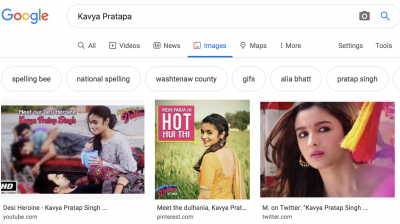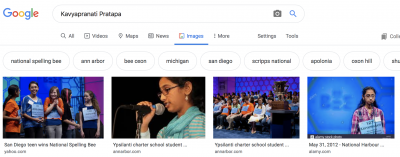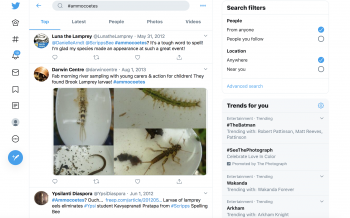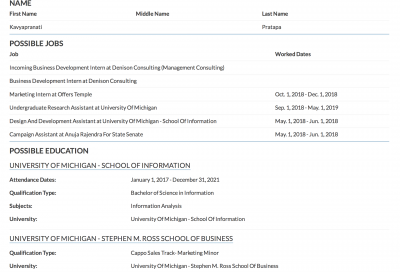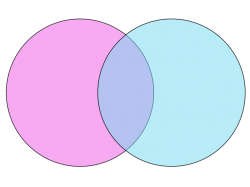Difference between revisions of "Kavya Pratapa"
(→Self via Google) |
|||
| (102 intermediate revisions by the same user not shown) | |||
| Line 1: | Line 1: | ||
| − | + | <b>All of my life I've been known as ‘Kavya Pratapa’</b>. I initially[[File:Screen Shot 2020-02-13 at 8.43.10 PM.png|400px|thumbnail|right|The images I see when I google 'Kavya Pratapa']] adopted this abbreviated version of my birth name to make navigating the social boundaries of school easier, and for the most part, it worked! While there were indeed some awkward moments when my birth name would make its appearance on attendance sheets, being referred to as 'Kavya' took away the stresses of having a name that no one could recognize or pronounce. It made it easier for me to interact with my teachers, friends, and classmates on a personal level. | |
| − | All of my life I | + | |
| − | + | In a world where our name forms a large part of our identity, I believed that being known as ‘Kavya’ made my identity, both offline and online, much more clear-cut. In fact, until I started college, I rarely ever wrote my full name on anything unless it was legal business. Therefore, when I embarked on this project to better understand my online identity, I expected to see a lot of information about myself under my abbreviated name. Yet, I quickly realized that much of the information online was not about ‘Kavya Pratapa’, but actually about ‘Kavyapranati Pratapa’ <b>(my birth name)</b>. | |
| − | + | ||
| − | |||
| − | == | + | ==<b> My 'Google' Identity</b> == |
| − | + | ===Search Query: 'Kavya Pratapa' === | |
| + | When I first googled my abbreviated name <b>‘Kavya Pratapa’,</b> most of my social media accounts (e.g. Facebook and Instagram) came up. Within the first page of my search results, I found details about some Quiz Bowl competitions from high school, a couple of local newspaper articles about me from when I used to compete in spelling bee competitions, and information about my Youtube account that I no longer use. However, I very quickly noticed that after <b>5 or 6 pertinent search results</b>, the information that came up was not related to me in any way. In fact, a lot of the other search results were about a Bollywood film in which the lead actress’s name was ‘Kavya Pratap Singh’ (see above image). | ||
| − | + | ===Search Query: 'Kavyapranati Pratapa' === | |
| + | On the other hand, when I googled[[File:Screen_Shot_2020-02-13_at_10.09.49_PM.png|400px|thumbnail|right|The first 4 Images when I googled my full name ]] my given birth name <b>‘Kavyapranati Pratapa’,</b> I was able to find almost <b>5 pages of content</b> that all had relevance to me! The top two search results were my Linkedin and WayUp profiles, but I also saw many more local newspaper articles about me from my spelling bee days within the first two pages. As I moved through the search results, I even found random blogs and discussion threads about the National Spelling Bee competitions that contained my name, with one user commenting how <em>"with a name like Kavyapranati Pratapa, they can spell anything"</em>. What was most surprising, however, was finding a <b>hashtag on Twitter</b> of the very word that I misspelled in the 2012 National Spelling Bee! | ||
| − | = | + | <br style = "margin-top:5px;">Apart from [[File:Screen Shot 2020-02-13 at 8.34.52 PM.png|350px|thumbnail|left|My very own Twitter Hashtag]]'spelling bee' related results, there were a couple pages that contained my name from other activities, such as my vocal performances, my Medium blog that I don't post on anymore, the university's Honors Convocation last year, and even under another data broker service <b>FastPeopleSearch.com</b>. It was pretty shocking to see how many different sources of information contained my name. There was just too much out there. |
| − | + | ||
| − | + | ===Self via Google=== | |
| + | Although I am aware of the dangers of having my online identity compromised, I have never given much thought to how easily my information online could be accessed. As Luciano Floridi writes “It’s not that we don’t care about privacy, but that we accept that being online may be one of the less private things about our life”. More than anything, I was pretty surprised to see information about me from 8 or 10 years ago so easily accessible. These were aspects about my identity that I didn't know were out there for anyone to view. | ||
| − | == | + | While I realized that I had little control over whether I wanted to disclose such information or not, none of what I saw about myself was compromising my carefully-crafted online self. Therefore, I wasn’t incredibly concerned over my lack of informational privacy. <b>It simply wasn't harmful to me</b>. |
| − | + | ||
| + | ==<b>My Instant Checkmate Identity</b>== | ||
| + | ===The Inaccuracies === | ||
| + | |||
| + | Likewise, as I looked through my data broker report, nothing seemed out of the ordinary or particularly harmful. The first couple pages were pulled from my Linkedin profile, though I did notice some inaccuracies in what was reported. For example, I wrote on my profile that I would be interning at Deloitte Consulting this summer, but also had my previous summer internship at [[File:Screen_Shot_2020-02-13_at_8.46.55_PM.png|400px|right|thumbnail|The First Page of my Instant checkmate Report]]Denison Consulting in Ann Arbor listed. When I looked at my report, however, the same company ‘Denison Consulting’ was listed for both my upcoming and my current internships. | ||
| + | |||
| + | Another discrepancy I noticed was in my education of the same ‘Linkedin section’. Prior to having been accepted to the business minor, I was a part of the Cappo Sales Track program through the Ross School of Business. Even though I have now updated my Linkedin profile to reflect my most current educational pursuits, my data broker profile depicted results from when I was still unsure of what my minor would be. As a result, this data is no longer accurate with what my educational pursuits are today. | ||
| + | |||
| + | ===The Interesting Details === | ||
| + | Something that was interesting to see in my data broker profile were my previous areas of residence. I have done all of my schooling in the Ann Arbor - Ypsilanti area, but I've lived in Troy, Michigan and Dearborn, Michigan in the past. It was pretty intriguing to see the exact addresses of the places I lived in within these cities mentioned in my report. Until I saw this data, I didn't even know where I lived in these cities! At the same time, however, the fact that my residence information is accessible to anyone who utilizes a data broker service like Instant Checkmate was pretty shocking to me and made me realize how information that I always thought was 'private' was <b>not</b> private. | ||
| + | |||
| + | I was also concerned to see the large amount of sex offenders that lived in my area. Growing up, I knew that Ypsilanti wasn’t one of the safest areas to live in, but I never paid that much attention to my surroundings. While learning this information certainly hasn't changed my decision to leave Ypsilanti by any means, I am a little bit more aware of my surroundings and the demographics of the people that live in my general community. Lastly, echoing the phenomenon I observed when I googled myself, I noticed that only my Linkedin profile and email popped up under the social media category of the report. Though I was baffled at first, I eventually realized that neither my Facebook nor my Instagram accounts would be 'dug up' by the data broker since they both feature my <b>abbreviated name</b> ‘Kavya Pratapa’. | ||
| + | |||
| + | This led me to ask the same question that Haimson & Hoffman reference in their ‘Constructing and Enforcing “Authentic" Identity Online’: <b>which name constitutes as my authentic or <em>real</em> identity?</b> | ||
| + | |||
| + | ==<b>My Online Self - Instant Checkmate & Google</b> == | ||
| + | For me, both of my names ‘Kavya Pratapa’ and ‘Kavyapranati Pratapa’ are parts of my authentic self. While I only use my full name for professional and official purposes, my abbreviated name ‘Kavya’ has allowed me to socially assimilate to a greater degree. Yet, on Instant Checkmate, these two names seem to be independent of one another. As 'Kavyapranati Pratapa', I couldn’t view any information about my Facebook or Instagram accounts via the Instant Checkmate report. While I am not incredibly active on either platform, it's still data that provides valuable insight into my social life, such as the student organizations I'm a part of on campus or the people I choose to hang out with. Unlike what I was expecting, I realized that my Instant Checkmate profile <b>did not provide me with a complete picture of who I was</b>. | ||
| + | |||
| + | This led me to wonder whether the versions of myself I was seeing on Google and on my data broker report were consistent with one another. While the presence of several sex offenders on my Instant Checkmate profile was a mild "blow" to the 'self' that I wanted to project, that is more a consequence of where I live rather than who I am. Apart from that, all of the information about me via Google and Instant Checkmate depicted a pretty positive version of myself: I am a student at a world class institution like the University of Michigan, I have had the opportunity to engage in a variety of experiences beyond my classes such as research, and I have been able to pursue professional opportunities in the consulting industry. In a lot of ways, my data broker profile echoes the same version of myself as my 'google search' results: <b>A university student who has always been involved in academic and professional pursuits.</b> | ||
| + | |||
| + | ===Spheres of Identity === | ||
| + | I realized that conducting both a ‘google search’ and a review of my data broker profile did not portray a version of myself that I found to be compromising of my identity online. However, having two different names, though both are equally important to my identity, [[File:6a0120a8cae999970b01a5119de533970c-2.png|250px|right|thumbnail|We all exist in different spheres based on who we interact with]] portrayed an essentially curated but positive version of myself. I also realized that my online identity, depending on which name I use, only depicts one sphere of my life at a time. | ||
| + | |||
| + | When I first searched myself as 'Kavya Pratapa', I did see some information that was pertinent to my previous academic ventures, but for the most part, only saw my social media accounts. On the other hand, searching myself as 'Kavyapranati Pratapa' provided me with results mostly related to my academic and professional life. Academics have always been important to me and are still crucial to my identity, but I realized that having fun and spending time with my friends is just as important to my own understanding of who I am. It’s only when I use my identity ‘Kavya’ that you start to see me as someone beyond academics and schoolwork. In a way, my abbreviated name becomes my ticket to seeing my curated online social identity [<b>Sphere 1</b>] while my full name depicts my curated online professional identity [<b>Sphere 2</b>]. | ||
| + | |||
| + | But, this isn't that far off from our offline lives. Our close friends in a social setting don't experience the part of ourselves that goes to work at 7 am in the morning, just as our colleagues don't see our 'wild side' at parties. Depending on who we are interacting with, different parts of our identity come into play, and our behaviors reflect the persona that we are trying to portray. While I was initially surprised that I could not find a complete picture of who I was online, I realized as I was completing this project that my offline interactions don't really provide me with a complete picture of who I am either. | ||
| + | |||
| + | Because at the end of the day, I, like everyone else, exist in multiple spheres. <b>And I'm okay with that</b>. | ||
| + | |||
| + | ==<b>References</b> == | ||
| + | |||
| + | 5, Privacy.” The 4th Revolution: How the Infosphere Is Reshaping Human Reality, by Luciano Floridi, Oxford University Press, 2016, pp. 110–110. | ||
| + | |||
| + | Haimson, O. L., & Hoffmann, A. L. (2016). Constructing and enforcing" authentic" identity online: Facebook, real names, and non-normative identities. First Monday, 21(6). | ||
| + | |||
| + | Shoemaker, David W. “Self-Exposure and Exposure of the Self: Informational Privacy and the Presentation of Identity.” Ethics and Information Technology, vol. 12, no. 1, 2009, pp. 3–15., doi:10.1007/s10676-009-9186-x. | ||
Latest revision as of 19:59, 28 February 2020
All of my life I've been known as ‘Kavya Pratapa’. I initially adopted this abbreviated version of my birth name to make navigating the social boundaries of school easier, and for the most part, it worked! While there were indeed some awkward moments when my birth name would make its appearance on attendance sheets, being referred to as 'Kavya' took away the stresses of having a name that no one could recognize or pronounce. It made it easier for me to interact with my teachers, friends, and classmates on a personal level.In a world where our name forms a large part of our identity, I believed that being known as ‘Kavya’ made my identity, both offline and online, much more clear-cut. In fact, until I started college, I rarely ever wrote my full name on anything unless it was legal business. Therefore, when I embarked on this project to better understand my online identity, I expected to see a lot of information about myself under my abbreviated name. Yet, I quickly realized that much of the information online was not about ‘Kavya Pratapa’, but actually about ‘Kavyapranati Pratapa’ (my birth name).
Contents
My 'Google' Identity
Search Query: 'Kavya Pratapa'
When I first googled my abbreviated name ‘Kavya Pratapa’, most of my social media accounts (e.g. Facebook and Instagram) came up. Within the first page of my search results, I found details about some Quiz Bowl competitions from high school, a couple of local newspaper articles about me from when I used to compete in spelling bee competitions, and information about my Youtube account that I no longer use. However, I very quickly noticed that after 5 or 6 pertinent search results, the information that came up was not related to me in any way. In fact, a lot of the other search results were about a Bollywood film in which the lead actress’s name was ‘Kavya Pratap Singh’ (see above image).
Search Query: 'Kavyapranati Pratapa'
On the other hand, when I googled my given birth name ‘Kavyapranati Pratapa’, I was able to find almost 5 pages of content that all had relevance to me! The top two search results were my Linkedin and WayUp profiles, but I also saw many more local newspaper articles about me from my spelling bee days within the first two pages. As I moved through the search results, I even found random blogs and discussion threads about the National Spelling Bee competitions that contained my name, with one user commenting how "with a name like Kavyapranati Pratapa, they can spell anything". What was most surprising, however, was finding a hashtag on Twitter of the very word that I misspelled in the 2012 National Spelling Bee!Apart from 'spelling bee' related results, there were a couple pages that contained my name from other activities, such as my vocal performances, my Medium blog that I don't post on anymore, the university's Honors Convocation last year, and even under another data broker service FastPeopleSearch.com. It was pretty shocking to see how many different sources of information contained my name. There was just too much out there.
Self via Google
Although I am aware of the dangers of having my online identity compromised, I have never given much thought to how easily my information online could be accessed. As Luciano Floridi writes “It’s not that we don’t care about privacy, but that we accept that being online may be one of the less private things about our life”. More than anything, I was pretty surprised to see information about me from 8 or 10 years ago so easily accessible. These were aspects about my identity that I didn't know were out there for anyone to view.
While I realized that I had little control over whether I wanted to disclose such information or not, none of what I saw about myself was compromising my carefully-crafted online self. Therefore, I wasn’t incredibly concerned over my lack of informational privacy. It simply wasn't harmful to me.
My Instant Checkmate Identity
The Inaccuracies
Likewise, as I looked through my data broker report, nothing seemed out of the ordinary or particularly harmful. The first couple pages were pulled from my Linkedin profile, though I did notice some inaccuracies in what was reported. For example, I wrote on my profile that I would be interning at Deloitte Consulting this summer, but also had my previous summer internship at Denison Consulting in Ann Arbor listed. When I looked at my report, however, the same company ‘Denison Consulting’ was listed for both my upcoming and my current internships.Another discrepancy I noticed was in my education of the same ‘Linkedin section’. Prior to having been accepted to the business minor, I was a part of the Cappo Sales Track program through the Ross School of Business. Even though I have now updated my Linkedin profile to reflect my most current educational pursuits, my data broker profile depicted results from when I was still unsure of what my minor would be. As a result, this data is no longer accurate with what my educational pursuits are today.
The Interesting Details
Something that was interesting to see in my data broker profile were my previous areas of residence. I have done all of my schooling in the Ann Arbor - Ypsilanti area, but I've lived in Troy, Michigan and Dearborn, Michigan in the past. It was pretty intriguing to see the exact addresses of the places I lived in within these cities mentioned in my report. Until I saw this data, I didn't even know where I lived in these cities! At the same time, however, the fact that my residence information is accessible to anyone who utilizes a data broker service like Instant Checkmate was pretty shocking to me and made me realize how information that I always thought was 'private' was not private.
I was also concerned to see the large amount of sex offenders that lived in my area. Growing up, I knew that Ypsilanti wasn’t one of the safest areas to live in, but I never paid that much attention to my surroundings. While learning this information certainly hasn't changed my decision to leave Ypsilanti by any means, I am a little bit more aware of my surroundings and the demographics of the people that live in my general community. Lastly, echoing the phenomenon I observed when I googled myself, I noticed that only my Linkedin profile and email popped up under the social media category of the report. Though I was baffled at first, I eventually realized that neither my Facebook nor my Instagram accounts would be 'dug up' by the data broker since they both feature my abbreviated name ‘Kavya Pratapa’.
This led me to ask the same question that Haimson & Hoffman reference in their ‘Constructing and Enforcing “Authentic" Identity Online’: which name constitutes as my authentic or real identity?
My Online Self - Instant Checkmate & Google
For me, both of my names ‘Kavya Pratapa’ and ‘Kavyapranati Pratapa’ are parts of my authentic self. While I only use my full name for professional and official purposes, my abbreviated name ‘Kavya’ has allowed me to socially assimilate to a greater degree. Yet, on Instant Checkmate, these two names seem to be independent of one another. As 'Kavyapranati Pratapa', I couldn’t view any information about my Facebook or Instagram accounts via the Instant Checkmate report. While I am not incredibly active on either platform, it's still data that provides valuable insight into my social life, such as the student organizations I'm a part of on campus or the people I choose to hang out with. Unlike what I was expecting, I realized that my Instant Checkmate profile did not provide me with a complete picture of who I was.
This led me to wonder whether the versions of myself I was seeing on Google and on my data broker report were consistent with one another. While the presence of several sex offenders on my Instant Checkmate profile was a mild "blow" to the 'self' that I wanted to project, that is more a consequence of where I live rather than who I am. Apart from that, all of the information about me via Google and Instant Checkmate depicted a pretty positive version of myself: I am a student at a world class institution like the University of Michigan, I have had the opportunity to engage in a variety of experiences beyond my classes such as research, and I have been able to pursue professional opportunities in the consulting industry. In a lot of ways, my data broker profile echoes the same version of myself as my 'google search' results: A university student who has always been involved in academic and professional pursuits.
Spheres of Identity
I realized that conducting both a ‘google search’ and a review of my data broker profile did not portray a version of myself that I found to be compromising of my identity online. However, having two different names, though both are equally important to my identity, portrayed an essentially curated but positive version of myself. I also realized that my online identity, depending on which name I use, only depicts one sphere of my life at a time.When I first searched myself as 'Kavya Pratapa', I did see some information that was pertinent to my previous academic ventures, but for the most part, only saw my social media accounts. On the other hand, searching myself as 'Kavyapranati Pratapa' provided me with results mostly related to my academic and professional life. Academics have always been important to me and are still crucial to my identity, but I realized that having fun and spending time with my friends is just as important to my own understanding of who I am. It’s only when I use my identity ‘Kavya’ that you start to see me as someone beyond academics and schoolwork. In a way, my abbreviated name becomes my ticket to seeing my curated online social identity [Sphere 1] while my full name depicts my curated online professional identity [Sphere 2].
But, this isn't that far off from our offline lives. Our close friends in a social setting don't experience the part of ourselves that goes to work at 7 am in the morning, just as our colleagues don't see our 'wild side' at parties. Depending on who we are interacting with, different parts of our identity come into play, and our behaviors reflect the persona that we are trying to portray. While I was initially surprised that I could not find a complete picture of who I was online, I realized as I was completing this project that my offline interactions don't really provide me with a complete picture of who I am either.
Because at the end of the day, I, like everyone else, exist in multiple spheres. And I'm okay with that.
References
5, Privacy.” The 4th Revolution: How the Infosphere Is Reshaping Human Reality, by Luciano Floridi, Oxford University Press, 2016, pp. 110–110.
Haimson, O. L., & Hoffmann, A. L. (2016). Constructing and enforcing" authentic" identity online: Facebook, real names, and non-normative identities. First Monday, 21(6).
Shoemaker, David W. “Self-Exposure and Exposure of the Self: Informational Privacy and the Presentation of Identity.” Ethics and Information Technology, vol. 12, no. 1, 2009, pp. 3–15., doi:10.1007/s10676-009-9186-x.
